|
Printables |
PowerPoints |
Online exercises |

|
What needs to be done? Part 4 of 5
Students to complete the verb then make sentences (oral or written) using need/s + verb ing for each picture. For higher level students where possible they think of another suitable synonym which could also be used. See example on first picture.
Level: elementary
Age: 9-100
Type: activity-card
Downloads: 261
|
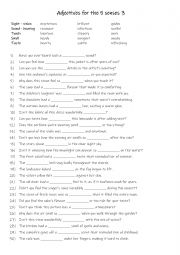
|
A2+-B1 Adjectives for the 5 senses 3
Mastering these adjectives helps students describe experiences, express emotions, and write creatively, fostering richer and more impactful communication. First, students need to familiarise themselves with 15 adjectives and check their meaning and use. Then they read the sentences to see which one is needed to complete the sentence. Answers on pag...
Level: intermediate
Age: 8-100
Type:
Downloads: 107
|
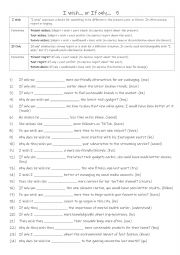
|
B1-B2 I wish�. or If only�. 5
They help students communicate feelings like hope, frustration, or disappointment and strengthen their understanding of unreal or hypothetical grammar forms, making their communication more advanced and expressive. These structures are vital for clear, expressive, and advanced communication in both spoken and written contexts. First, students need ...
Level: intermediate
Age: 12-100
Type:
Downloads: 109
|
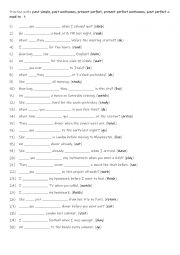
|
A2+-B1 Practise with past simple, past continuous, present perfect, present perfect continuous, past perfect & used to 1
Practising these tenses helps students express different aspects of time and actions effectively. The past simple is vital for describing completed actions, while the past continuous sets scenes or shows interruptions in the past. The present perfect connects past actions to the present, and the present perfect continuous highlights ongoing or repe...
Level: intermediate
Age: 9-100
Type:
Downloads: 100
|
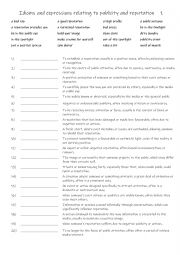
|
B1+-C1 Idioms and expressions relating to publicity and reputation 1
First, students need to familiarise themselves with the 20 idioms and expressions and their meanings. Then they read the definitions to see which one is being described and write that word in the space provided Answers on page 2.
Level: intermediate
Age: 12-100
Type:
Downloads: 113
|
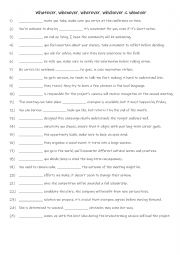
|
B1-B2 Indefinite pronouns Whatever, whenever, wherever, whichever & whoever
These words allow students to express ideas more openly without limiting their answers or choices, making conversations more adaptable and fluid. Additionally, using these words, you avoid lengthy explanations, as they help cover multiple possibilities in one word. Each indefinite pronoun is used 5 times. Answers on page 2.
Level: intermediate
Age: 9-100
Type: worksheet
Downloads: 111
|
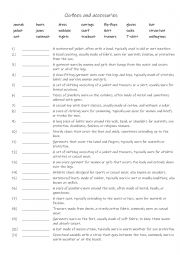
|
A2-B1 Clothes and accessories
Students match the clothes & accessories to their definition. After checking the answers, in pairs or small groups,this worksheet could also be used as a defining relative clause speaking component. Answers on page 2.
Level: elementary
Age: 10-100
Type:
Downloads: 127
|
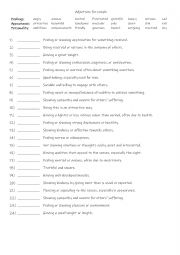
|
A2+-B1 8 adjectives for each - feelings - appearance and personality
Learning vocabulary for feelings, appearance, and personality enables clearer and more expressive communication. Words for emotions like "anxious" or "excited" help us convey our moods and understand others better, strengthening relationships. Descriptive terms for appearance, such as "slim" or "muscular," are useful for identifying people, setting...
Level: intermediate
Age: 8-100
Type:
Downloads: 112
|
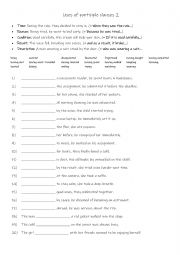
|
5 uses of participle clauses 2
Students should learn the five uses of participle clauses because they help create more concise, fluid, and sophisticated sentences. These clauses allow for the expression of time, reason, condition, result, and description in a shorter, more efficient way, making writing and speaking more dynamic and less repetitive. For example, participle clause...
Level: intermediate
Age: 10-100
Type:
Downloads: 119
|
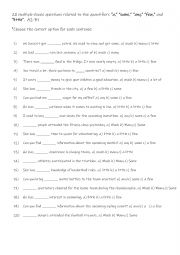
|
Quantifiers practise using a, some, any, few, and little.
20 multiple-choice questions related to the quantifiers a,some,any, few,and little. A2-B1.Answers on page 2
Level: elementary
Age: 10-100
Type: worksheet
Downloads: 106
|
|
|
|
|












